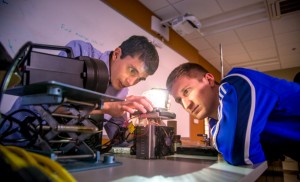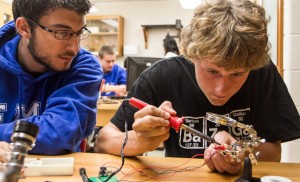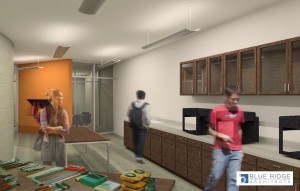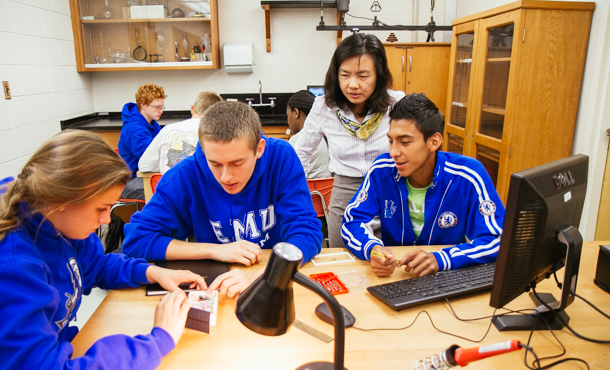Overseeing construction of a footbridge connecting a rural Latin American village to the wider world, deepening our collective human understanding of bubble science, or helping design a new and improved airplane wing are admirable creative and scientific feats that might appear on an engineer’s CV.
And soon, for the first time ever, CVs like these might include graduation from a four-year engineering program at Eastern Mennonite University (EMU).
For more than 20 years, EMU has offered a pre-engineering program, allowing students to begin coursework toward an engineering degree but requiring them to transfer to another school after several semesters. In the fall of 2016, however, a full engineering undergraduate major will be offered.
Prospective students have, for many years, expressed interest in a full engineering program. Deirdre Smeltzer, a professor in the mathematical sciences department before becoming undergraduate dean in 2013, said offering a full major had also long been discussed at the university but hadn’t seemed feasible.
That began to change after professors Esther Tian and Daniel King – both with PhDs in mechanical engineering – joined the mathematical sciences department in 2013. Recent and upcoming renovations to the Suter Science Center also allow for enough laboratory and classroom space to host a full-fledged engineering program.

“That created the opportunity for us to think, ‘maybe we could really do this,’” said Smeltzer.
Serious planning, including visits to other small universities with engineering programs and the creation of an advisory committee, began about a year ago.
Seven students already enrolled
The new program will offer a general engineering degree with options to focus on mechanical or computer engineering. As the major grows, Smeltzer said, future emphases might include environmental and biomedical engineering, building on EMU’s existing undergraduate and graduate programs in environmental science and biomedicine. The university will likely hire new faculty members in computer science and computer engineering in the near future to support the new program, Smeltzer added.
While undergraduate degrees in engineering can lead to a wide range of careers, all of them involve problem-solving, design and math. These will be important areas of focus in the new curriculum, said King, whose teaching load will include courses in design, analog circuits, fluid mechanics and mathematical modeling.
Though the program has only recently received final approval, seven incoming first-year students have declared as engineering majors, and several others are interested.
One of those new engineering majors is Ben Stutzman, from Lancaster, Pennsylvania, who plans on a career in architecture. Stutzman had been considering several other schools when he heard that EMU was about to launch its new engineering program, and after some thought, decided to enroll.
“I’m not sure yet what kinds of buildings I want to design, but whatever I do, I would definitely want to focus on green, environmentally-friendly designs,” said Stutzman, who hopes that an engineering background will eventually inform the technical aspects of his architecture.

“I’m [also] looking forward to having more one-to-one attention from the professors, since the class size will be small and the faculty all seem dedicated and invested in the program,” he added.
Small class sizes a benefit
Advisory committee member Eric Moyer, class of ’03, said small class sizes and close interaction with professors will be important benefits of EMU’s small engineering program, which won’t have access to the same resources and facilities as large schools. Moyer spent three semesters in EMU’s pre-engineering program before transferring to Drexel University in Philadelphia, where he and his hundreds of classmates sometimes had to put their student ID numbers rather than their names on all their assignments.
“I decided to go to EMU because I really wasn’t into the mega-school atmosphere,” said Moyer, now a project engineer working on a new composite airplane wing for Boeing in Everett, Washington. “Here we bring in lots of folks from the big state schools. The facilities are great selling points, but I think the thing that’s going to benefit anyone going to EMU over the other schools are smaller class sizes … and being involved in a community that’s there for your success.”
EMU’s broader focus on cross-cultural learning and pursuit of the common good will also help distinguish the new program, which has been designed to accommodate a semester-long cross-cultural program that many students participate in.

“Engineering schools can spit out good technicians, but what we really also need is technicians who have some heart, and that can apply [their skills] to things that are good for society,” said advisory committee member Johann Zimmermann, a civil and structural engineer based in Harrisonburg, Virginia.
“The ‘common good’ framework we apply to all our academic programs will also be an important part of our approach to engineering,” said Smeltzer. “Training engineers who help meet the world’s needs will fit EMU’s mission of preparing students to serve and lead in a global context.”
In addition to Zimmermann and Moyer, the advisory committee that helped EMU plan the new program over the past year included:
- Owen Byer (chair) – professor of mathematics
- Sara Atwood – assistant professor of engineering and physics at Elizabethtown College
- Ashley Driver – director of operations, Howell Metal, New Market, Virginia
- John Swartzendruber ’79 – Former computer engineer, Eli Lilly, Indianapolis, Indiana
- John-David Yoder – chair and professor of mechanical engineering at Ohio Northern University
The engineering program will begin using classroom and laboratory space in the recently renovated east half of the Suter Science Center. Upcoming renovations to the west half of the building will provide more space for the new program, including a laboratory with specialized equipment like 3-D printers. Future plans also call for the construction of a new machine shop on campus.
